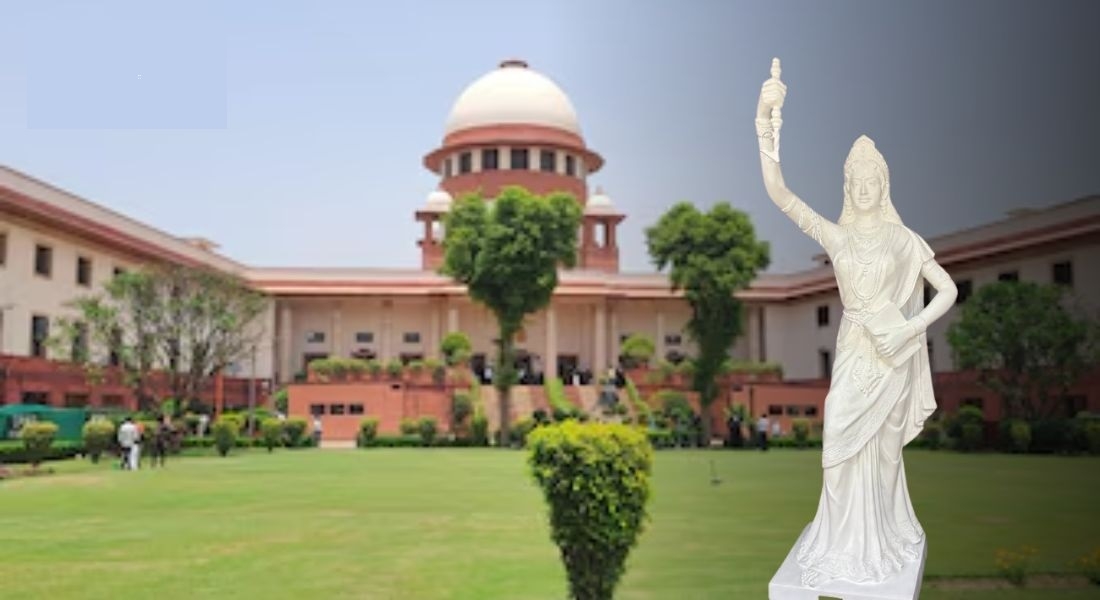New ‘Lady Justice’ statue in Supreme Court library without blindfold, sword
| Date :18-Oct-2024 |

NEW DELHI :
THE Supreme Court of India has a new ‘Lady Justice’ -- a six-foot-tall sculpture in the judges’ library holding scales in one hand and the Constitution in the other sans the sword.
Dressed in white traditional attire, the ‘Goddess of Justice’ is without her archetypal blindfold and sword, as she bears a crown on her head.
Senior advocate Rakesh Dwivedi however asserts that the change brings “no significant shift” in the idea of how justice should be dispensed.
“No significant shift emerges by this alteration of the statue of Lady Justice. Blindfold never meant justice is blindly dispensed by Judiciary. It actually meant blindness to bias, favouritism and prejudices.
Now, the lady has no blindfold. That still means judges should see the world and country but they shouldn’t succumb to the evils,” Dwivedi told PTI. While welcoming the Indianness of the new avatar, senior advocate Gopal Sankaranarayanan said it would be “interesting” to see the idea behind the taking off the blindfold, which, CJI D Y Chandrachud earlier reportedly said, signifies that the law is never blind.
Sankaranarayanan said the earlier statue was “very European”, having no familiar orientation, and the new sculpture was symbolic of a “new direction that the idea of justice should take”.
“It (the earlier statue) did not really have an India connection and it was interesting for me to see (the new statue). It has Bharat Mata kind of long hair and there is a crown,” he shared with PTI.
“History says the blindfold signified that justice is blind. It is meant to be completely impartial, without looking into the status of the individual. So there was a history and context to that.
It will be interesting to see what the idea is (behind the removal of the blindfold),” added the senior counsel.
Renowned criminal law expert, senior advocate Vikas Pahwa, spoke on the shift from “sword to Constitution”, saying it sends the message that justice is based on the Supreme Law of the land, and not force or punishment.
“It reinforces the idea that the Constitution is the ultimate authority in judicial decision making. The new statue redefines traditional symbols to emphasise constitutional governance, informed awareness, and justice rooted in the principles of equality, inclusivity, and democracy. It also signifies that it is attentive to the complexities of society and committed to delivering justice that is both fair and compassionate”, he told PTI.
The removal of the blindfold, Pahwa said, represents impartiality.
The origin of ‘Lady Justice’ can be traced to both history and mythology, and is commonly associated with the Greek goddess of justice, Justitia.
While the blindfold over her eyes denoted impartiality and fairness, the sword signified the might of law.
There are several sculptures and paintings of ‘Lady Justice’ across the world but not all depict her with a blindfold. The blindfold, scholars have claimed, was a subsequent addition to her visual symbolism.
A golden statue of ‘Lady Justice’ -- without the blindfold and scales and sword -- sits atop the Central Criminal Court in London.
The sculpture of Justitia, which is outside the Supreme Court of Canada, is also without the blindfold and wields a sword.
The Supreme Federal Court in Brazil is home to sculptor Alfredo Ceschiatti’s ‘The Justice’ which shows a blindfolded woman sitting with a sword.
